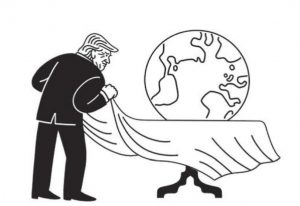Look Down Under for clues to the New World Dis-Order in this age of President Trump
 Here’s the effect Donald Trump is having on the new world order.
Here’s the effect Donald Trump is having on the new world order.
Disparate countries are speaking up in unheard-of ways.
Many are saying unbelievably undiplomatic things (a la Mr Trump).
Almost no one is disavowing nuclear options, sometimes for real.
Australia, for example, recently walked away from United Nations talks that seek to ban and eliminate nuclear weapons.
And a former Australian foreign minister has called for acceptance of China as a legitimate “global rule-maker”.
It’s interesting that Gareth Evans said what he did on Thursday, April 13, the day that Donald Trump’s America dropped the largest non-nuclear bomb in its arsenal on Afghanistan’s Nangarhar province.
Mr Evans clearly, was not impressed by this message that President Trump is said to have sent the world, notably that the US is ready and willing to bomb its way to unquestioned world dominance.
Instead, Mr Evans deplored Mr Trump as “the most ill-informed, under-prepared, and psychologically ill-equipped president in US history”. And he urged Australia to reduce its dependence on the US alliance (though not walk away from it entirely), while boosting its own defence spending including on nuclear-powered submarines. The context of Mr Evans’s remarks was the launch of a book by former diplomat Allan Gyngell, titled Fear of Abandonment: Australia in the World Since 1942.
So, just how frightened is Australia of the new world order?
It’s anxious, for sure, but clearly also determined on strategic resoluteness as it re-thinks its options.
Mr Evans’s meaning was nuanced even if his words didn’t seem to be. He argued for “less reflexive support for everything the US chooses to do”. That’s a reference to
Australia’s support for the 2003 invasion of Iraq and the approval voiced for Mr Trump’s missile strikes in Syria in the first week of April.
And he suggested that Australia doff a diplomatic hat to Beijing as “a global rule maker and not just rule taker”.
It’s significant too that he argued for Australia to claim “some strategic space of its own”.
Is Down Under going up in the world of big-power politics?

